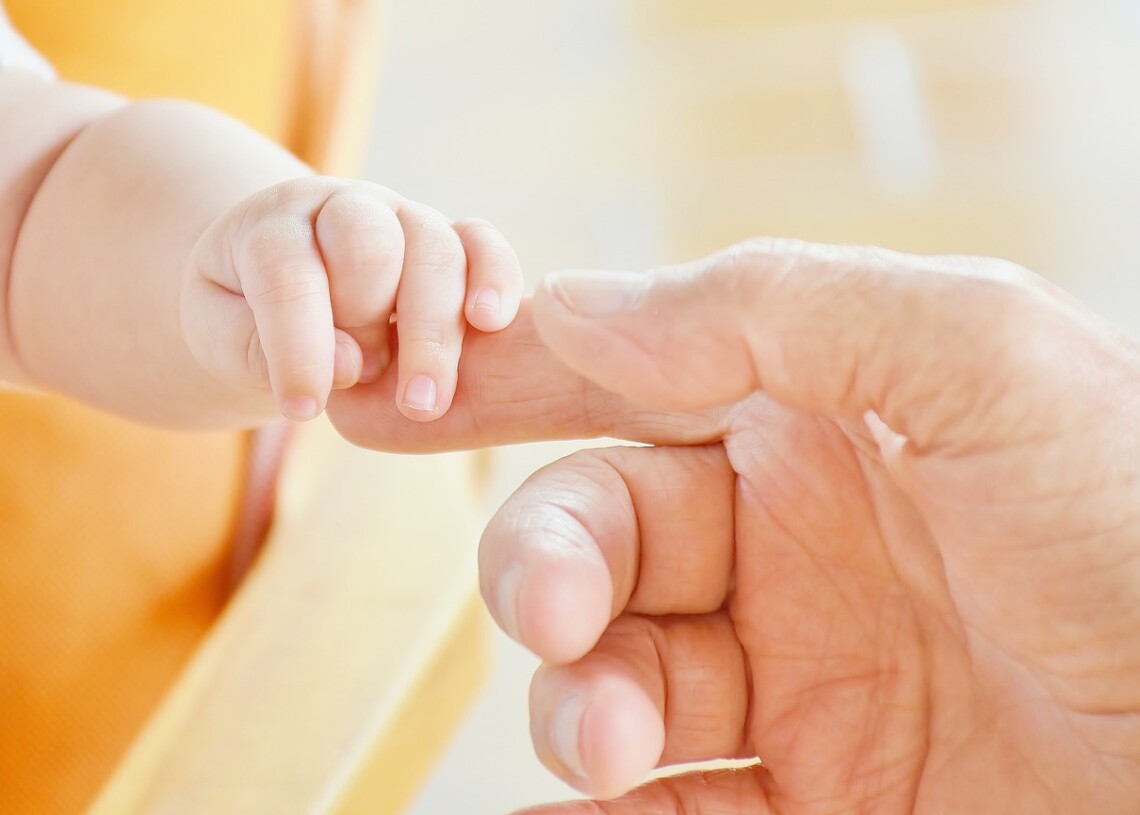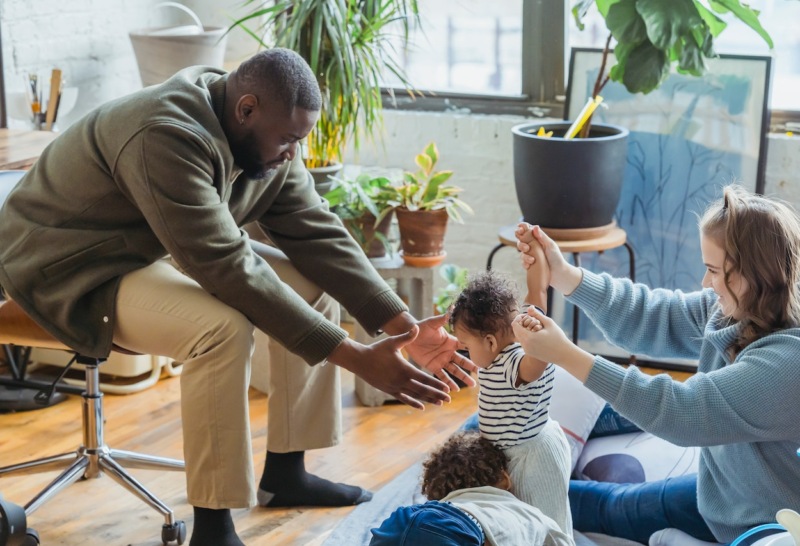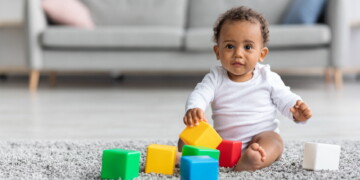It probably feels unreal when looking down on the little human you and your partner created. Having a baby can make you feel something you’ve never felt before in the best way possible.
It’s not uncommon to wonder whether these tiny humans feel or see things as we do. If you’re wondering how and when the senses in a newborn develop, then this article is for you!
Key Notes
- Newborns come into the world with all five senses present
- Some senses are fully formed, while others develop as the child grows older
- Taste is the first sense that a newborn develops
- Doing certain things like reading, singing to the baby, or holding them can improve the development of all the senses
What Are The 5 Senses?
The five senses are vital in order for proper development and are, no doubt, highly essential for living through life.
The five senses consist of the following:
- Hearing
- Sight
- Smell
- Touch
- Taste
Babies are born with all five senses, some being more pronounced than the others. However, with time babies’ senses get more refined, and that’s eventually what makes their own personality.
When Do, The Five Senses, Develop in Newborns?
Even though they’re so tiny, babies are born with all the five senses just like any other adult human. The only difference is that at that time, a few senses aren’t as developed as they do later in time.

Touch
The first ever sense that comes to a newborn is touch! It may be a bit surprising, but the touch sense actually develops while the baby is still in the womb at around 20 weeks’ gestation. There’s no wonder why babies love skin-to-skin contact with their mothers so much!
A strong sense of touch is what, in the future, helps the child develop cognitive skills and physical abilities along with emotional and social growth. Doesn’t it feel nice when a newly born baby grasps your finger with its small fingers? That’s because they have that as a natural reflex.
When a baby comes out of the womb, it can be confusing for them to be exposed to a new world, so it’s important you let them know you’re there by lightly stroking or holding them close to letting them know you’re there.

Taste
At birth, the babies have their taste sense completely developed and, after some time, will actively cry out to be fed. It’s a known fact that babies prefer having sweet flavors rather than salty ones, which is why they love breast milk and formula milk as well.
But that’s not it, the sense of taste develops in the womb, too, and the food the mother eats flavors the amniotic fluid, which your baby might consume a bit. In addition, newborns have taste buds in more places, including the tonsils, throat, and tongue, which is why they are sensitive to sweet and bitter flavors.

Hearing
The hearing of a newborn is present before they’re even born. At times, the unborn baby may even respond to external voices by either kicking or hiccupping. After birth, the newborn will show a startle response to loud noises. So, it’s natural for babies to love listening to their mothers and other high-pitched voices in general.
The fact that babies can hear voices in the womb is the reason why they are able to recognize familiar voices when they come into the world. They also possess the power to block out loud noises, that’s why they are able to sleep for a long time even if there are voices or music being played.

Sight
Newborns get their vision after birth, and it isn’t fully formed yet. As a result, babies tend to see everything blurry and are really short-sighted, being able to see things 8-12inches close to their face.
That’s why you shouldn’t panic if you notice your newborn having uncoordinated eye movements, as that’s to be expected of them. However, if the cross-eyed movement is constant, it’s important to get it evaluated by a doctor.
In the start, babies only can recognize shapes, brightness, and darkness. However, by 8 weeks, they will start focusing their eyes on whoever is near them. Another fact is that newborns don’t see all the colors; they can visualize only grey, black and white. Good color vision develops in a child when they are around 5-8 months old.

Smell
In the last, known as the 3rd trimester of pregnancy, your baby’s smell center is fully formed. That means they can detect the scent of the food you eat during your pregnancy.
The baby will know what your scent is after being born and will be automatically drawn to it to look for comfort. A newborn can also strongly detect the smell of breastmilk and will often move their head towards the mother when they need feeding.
How to Improve Your Baby’s Senses?
You can do certain things to help develop your baby’s five senses so that as they grow up, they have a stronger sense of knowing what they like, along with other mental and physical skills.
Things to Do for Vision Development:
- Keep the baby close to your face so he can focus on it.
- If you made a nursery room for your child, decorate the room with bright colors.
- Change the baby’s position occasionally to help him view things from different angles
Things to Do for Hearing Development:
- Talk to the baby like you’re having a conversation.
- Reading and singing also have a role in the development of hearing in a child
- Playing soothing music can help to calm the baby
Things to Do for Taste Development:
- Eat different variety of food in front of the baby and tell them it’s yummy.
- Consume a healthy diet during pregnancy, so your child is slightly familiar with different tastes as he grows up.
Things to Do for Smell Development:
- For a newborn, your pheromones are what they can smell, and heavy perfumed things can confuse them.
- When the child grows older, introduce him to new things like coffee, lemon, etc., to help him familiarize himself with different scents.
Things to Do for Touch Development:
- Skin-to-skin contact with the mother is important as it’s therapeutic for the babies.
- Try some massages and other relaxing techniques
Can Babies Taste in The Womb?
In short, yes, they can. However, they can’t directly taste the found while in the womb; it’s just the flavor molecules of the food you consume that travel into the amniotic fluid.
And once the baby is born, they can taste different flavors through the breast milk. This is one of the reasons why breastfed babies are known to be more open to trying different flavors than the formula milk-fed ones.
Which Sense Is the Strongest in Newborns?
Although touch is the first sense babies develop, it’s not the strongest. The winner for the strongest sense in newborns is the sense of smell. Babies recognize every person, thing, and place through scents, as their vision isn’t that developed at that age.
Which Sense Is the Slowest to Develop After Birth?
The world will look fuzzy and blurry if seen through a newborn’s eyes because their vision sense is the slowest to develop. However, their vision evolves rapidly and reaches the adult’s eyesight level when they are 3-5 years old.




























